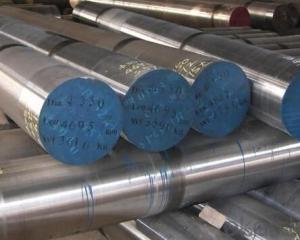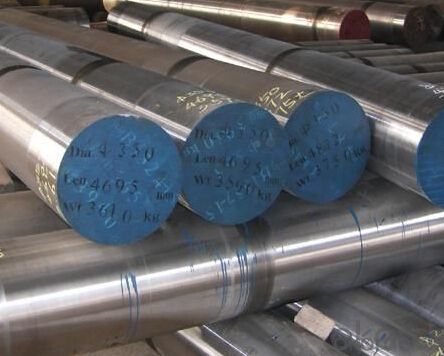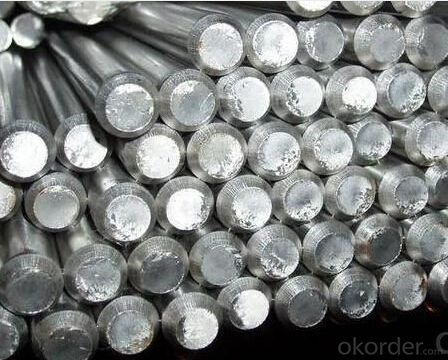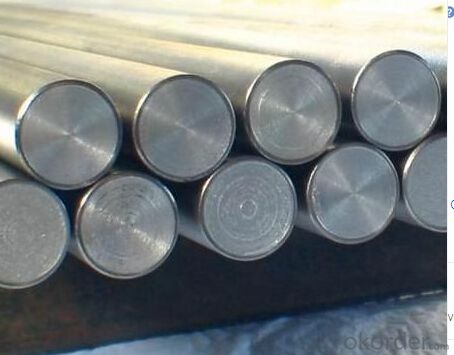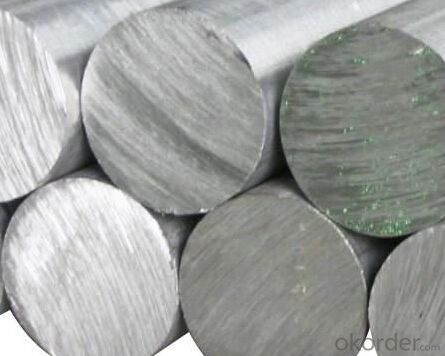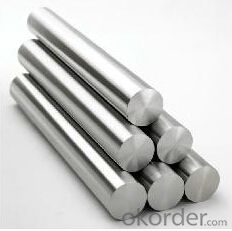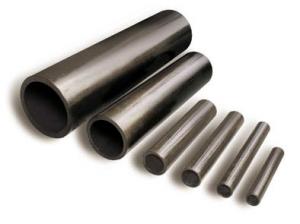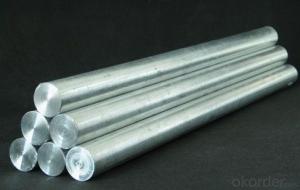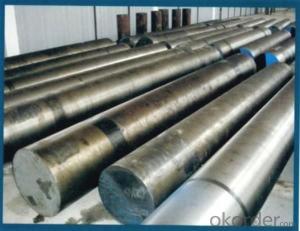High Quality Stainless Alloy Bearing Steel
- Loading Port:
- China Main Port
- Payment Terms:
- TT or LC
- Min Order Qty:
- -
- Supply Capability:
- -
OKorder Service Pledge
OKorder Financial Service
You Might Also Like
Product Description:
OKorder is offering High Quality Stainless Alloy Bearing Steel at great prices with worldwide shipping. Our supplier is a world-class manufacturer of steel, with our products utilized the world over. OKorder annually supplies products to European, North American and Asian markets. We provide quotations within 24 hours of receiving an inquiry and guarantee competitive prices.
Product Applications:
High Quality Stainless Alloy Bearing Steel are ideal for structural applications and are widely used in the construction of buildings and bridges, and the manufacturing, petrochemical, and transportation industries.
Product Advantages:
OKorder's High Quality Stainless Alloy Bearing Steel are durable, strong, and resist corrosion.
Main Product Features:
· Premium quality
· Prompt delivery & seaworthy packing (30 days after receiving deposit)
· Corrosion resistance
· Can be recycled and reused
· Mill test certification
· Professional Service
· Competitive pricing
Specifications of High Quality Stainless Alloy Bearing Steel
1. Grade: AISI 52100, ASTM E52100, DIN 1.3505,JIS SUJ2, GCr15
100Cr6 | 52100 | SUJ2 | GCr15 |
100CrMo7 | 100CrMo7 | SUJ5 | GCr18Mo |
20CrMo4 | 4118H | SCM418 | G20CrMo |
20NICrMo2 | 8520H | SNCM220 | G20CrNiMo |
- | - | 440C | 9Cr18 |
X108CrMo17 | S44004 | 440C | 9Cr18Mo |
2. Specification: Diameter: 5.5~350mm Length: 2000-6000mm or as required
3. Steel Grade: Bearing Steel
4. Certification: ISO9001-2000; CE, UL
5. Inspection: 100% Ultrasonic according to the test standards: SEP1921-84, GR.3 CLASS C/C
6. Packing situation: standard seaworthy packing or as customer required
7. Heat treatment:
Soft annealing: heat to 680-720°C, cool slowly.
Hardness after annealing: Max. 241 HB
Hardening: 820 - 850 °C
Normalizing temperature: 840-880°C
Tempering: 540-680°
Usage and Applications of Alloy Steel For Bearing
Alloy steel is used in making all kinds of bearing ring and rolling elements, like combustion engine, machine tool, and bearings for melting machine; also used for making tools and measuring tools.
Bearing steels are used for ball and roller bearing applications and are comprised of low carbon steels and high carbon through harden able steel.
Alloy Steel can be used in machine parts and engineering components.
Applications range: Chemical fertilizer pipe, building, machinery, textile industry, etc
Packaging & Delivery of Alloy Steel For Bearing
Packaging Detail: Standard seaworthy packing or as customer required; Packed in bundles with standard export sea-worthy package or as customer require
Delivery Detail: 45 days after order confirmed
Delivery condition: Black, peeled, machined
Trade terms: FOB, CFR, CIF
MOQ: 25 tons or at customer's demands
Production Flow of Alloy Steel For Bearing
Process: EAF+LF+VD+ Hot Rolled(Forged)+ Heat Treatment (Annealed, A Normalized, Q+T)
The processing is hot rolled (strictly control sulphur, phosphorus and non-metallic inclusions content and distribution).
FAQ:
Q1: Why buy Materials & Equipment from OKorder.com?
A1: All products offered byOKorder.com are carefully selected from China's most reliable manufacturing enterprises. Through its ISO certifications, OKorder.com adheres to the highest standards and a commitment to supply chain safety and customer satisfaction.
Q2: How do we guarantee the quality of our products?
A2: We have established an advanced quality management system which conducts strict quality tests at every step, from raw materials to the final product. At the same time, we provide extensive follow-up service assurances as required.
Q3: How soon can we receive the product after purchase?
A3: Within three days of placing an order, we will begin production. The specific shipping date is dependent upon international and government factors, but is typically 7 to 10 workdays.
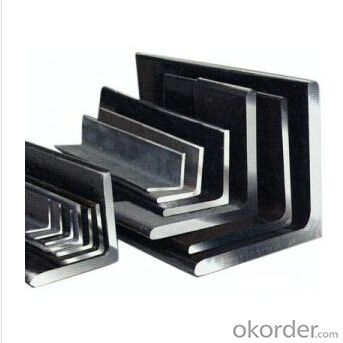
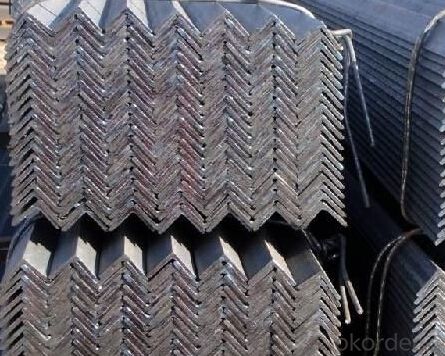
- Q: What are the different surface treatment techniques for special steel?
- There are several surface treatment techniques for special steel, including electroplating, hot-dip galvanizing, powder coating, and passivation. Electroplating involves depositing a thin layer of metal onto the steel surface to improve its corrosion resistance. Hot-dip galvanizing involves immersing the steel in molten zinc to create a protective coating. Powder coating involves applying a dry powder to the steel surface, which is then cured to create a durable and decorative finish. Passivation is a chemical process that removes impurities from the steel surface, enhancing its corrosion resistance.
- Q: What are the different grades and specifications of special steel?
- Special steel refers to a wide range of high-quality steels that are specifically designed to possess exceptional properties and meet specific requirements for various industrial applications. These grades and specifications of special steel are determined based on their composition, mechanical properties, and intended use. One commonly used grading system for special steel is the AISI-SAE system, which categorizes special steel into different grades based on their chemical composition. For example, AISI-SAE 4140 is a popular grade of special steel known for its high strength, toughness, and wear resistance. It contains elements such as chromium, molybdenum, and carbon, which contribute to its exceptional properties. Another widely used grading system is the ASTM system, which classifies special steel based on their mechanical properties and intended use. ASTM A36 is a commonly used grade of special steel that is known for its excellent weldability, toughness, and low carbon content. It is often used in structural applications, such as building construction and bridges. There are also specific grades and specifications of special steel for particular industries or applications. For example, stainless steel is a special steel grade that contains a high percentage of chromium, which provides excellent corrosion resistance. Stainless steel is commonly used in applications where resistance to moisture, chemicals, and high temperatures is required, such as in the food industry or medical equipment manufacturing. Furthermore, tool steel is a special steel grade specifically designed for making cutting and shaping tools. It possesses high hardness, wear resistance, and heat resistance, making it suitable for applications such as machining, forging, or die casting. In addition to these grades, special steel can also be categorized based on their specifications, such as heat treatment requirements, surface finish, or dimensional tolerances. These specifications ensure that the special steel meets the specific requirements of the intended application. Overall, the different grades and specifications of special steel are tailored to meet the diverse needs of various industries and applications, providing superior performance, durability, and reliability.
- Q: What are the requirements for special steel used in high-performance racing cars?
- The requirements for special steel used in high-performance racing cars include high strength and durability, excellent fatigue resistance, good thermal conductivity, and the ability to withstand high temperatures and extreme conditions. Additionally, it should have low weight and high stiffness to enhance the car's performance and maintain its structural integrity under intense stress and vibration.
- Q: What are the main characteristics of spring steel?
- Spring steel, which is specifically designed to possess excellent elasticity and resilience, is a type of high-carbon steel. Its notable property is that it can return to its original shape after being bent or deformed, making it ideal for applications that require repeated and controlled deflection. The key characteristics of spring steel include the following: 1. High Yield Strength: Spring steel demonstrates high yield strength, meaning it can withstand significant stress before permanent deformation occurs. This enables it to bear heavy loads and resist bending or breaking under pressure. 2. Exceptional Elasticity: An important feature of spring steel is its remarkable elasticity. It can be flexed, twisted, or stretched without permanent deformation, and once the force is released, it reverts back to its original shape. This property is crucial for applications that necessitate constant and repetitive motion. 3. Superior Fatigue Resistance: Spring steel has exceptional resistance to fatigue, allowing it to endure countless cycles of stress without failure. This characteristic is crucial for products subjected to continuous and repetitive loads, such as springs in automotive suspensions or industrial machinery. 4. Good Hardness and Wear Resistance: Spring steel is typically hardened to enhance its resistance to wear. This enables it to withstand abrasion and deformation under harsh conditions, making it suitable for applications involving friction or impact, such as cutting tools or automotive components. 5. Excellent Formability: Spring steel can be easily formed into various shapes and sizes, making it highly versatile for different applications. It can be cold-drawn, rolled, or heat-treated to achieve specific mechanical properties, allowing manufacturers to customize its characteristics based on their specific requirements. In conclusion, spring steel possesses high yield strength, exceptional elasticity, superior fatigue resistance, good hardness and wear resistance, and excellent formability. These qualities make it an essential material in various industries, including automotive, aerospace, construction, and manufacturing.
- Q: What are the different methods for improving the fatigue strength of special steel?
- There are various ways to enhance the fatigue strength of special steel: 1. Heat treatment is a commonly used approach, involving processes like annealing, quenching, and tempering. These treatments refine the steel's microstructure, reduce impurities, and boost fatigue resistance. 2. Surface treatments, such as shot peening and nitriding, can also enhance fatigue strength. Shot peening bombards the steel surface with small metal particles, inducing compression stress that prevents crack formation and propagation. Nitriding diffuses nitrogen into the surface layer, creating a hard and wear-resistant nitride layer that improves fatigue resistance. 3. Alloying special steel with specific elements, like chromium, molybdenum, or vanadium, can significantly improve fatigue strength. These elements form carbides or nitrides, acting as barriers against crack propagation. 4. Applying protective surface coatings, like electroplating, hot-dip galvanizing, or physical vapor deposition (PVD), can enhance fatigue strength. These coatings act as barriers against environmental factors that may cause corrosion or surface damage, ultimately extending the steel's fatigue life. 5. Grain refinement can be achieved through processes like severe plastic deformation or equal channel angular pressing (ECAP). By refining the grain size, the steel's fatigue strength can be improved, as fine-grained steels have higher resistance to crack initiation and propagation. 6. Residual stress management plays a crucial role in enhancing fatigue strength. Techniques like stress relieving or shot peening can reduce tensile residual stresses, which are detrimental to fatigue resistance. It's important to consider specific requirements, the type of special steel, and the intended application when selecting the most suitable method for improving fatigue strength.
- Q: How is special steel used in the production of pressure vessels?
- Special steel is used in the production of pressure vessels due to its high strength, durability, and resistance to corrosion. It ensures the vessel can withstand high internal pressure and harsh operating conditions, ensuring safety and reliability.
- Q: How does special steel contribute to the elasticity of products?
- The elasticity of products is improved by special steel, which has a distinct composition and manufacturing process. Elasticity refers to a material's capacity to revert to its initial shape or size after being stretched or deformed. Special steel enhances product elasticity in multiple ways. Firstly, special steel is commonly alloyed with elements like nickel, chromium, or vanadium, which enhance its mechanical properties. These alloying elements alter the steel's crystal structure, resulting in a material with higher yield strength and tensile strength. This increased strength enables the steel to endure higher levels of stress and deformation without permanent damage or failure. Furthermore, the manufacturing process of special steel involves precise control over its microstructure. Techniques such as heat treatment and cold working optimize the steel's grain size and distribution. This controlled microstructure improves the material's elasticity by facilitating uniform deformation. When a product made from special steel faces external forces or stress, its microstructure allows for the redistribution of these forces, minimizing localized deformation and maximizing overall elasticity. Moreover, special steel often contains a high carbon content, which contributes to its elasticity. The carbon atoms in the steel form strong chemical bonds with the iron atoms, resulting in a material with increased hardness and resistance to deformation. This enhanced resistance to deformation enables the steel to exhibit greater elasticity when subjected to external forces. In conclusion, special steel's unique composition, precise manufacturing processes, and specific alloying elements all contribute to its ability to enhance product elasticity. By incorporating special steel in the design and construction of various products, manufacturers can ensure that these products can withstand deformation and return to their original shape, thus increasing their durability and longevity.
- Q: What are the different impact-resistant grades of special steel?
- There are various impact-resistant grades of special steel, including AR400, AR500, AR550, and AR600. These grades are specifically designed to withstand high levels of impact and abrasion, making them suitable for applications such as construction equipment, industrial machinery, and mining tools.
- Q: How does special steel contribute to the electrical conductivity of products?
- Special steel contributes to the electrical conductivity of products by offering high levels of purity and low levels of impurities. Its composition and manufacturing process ensure that it has excellent conductivity and minimal resistance, allowing for efficient flow of electric current.
- Q: What are the requirements for special steel used in chemical processing?
- The requirements for special steel used in chemical processing are generally more stringent compared to regular steel due to the harsh and corrosive nature of the chemicals involved. Some of the key requirements for special steel in chemical processing include: 1. Corrosion resistance: Special steel used in chemical processing must exhibit high resistance to corrosion from acids, alkalis, and other corrosive chemicals. This is achieved by adding alloying elements such as chromium, nickel, and molybdenum, which form a protective oxide layer on the surface of the steel, preventing it from reacting with the chemicals. 2. High temperature resistance: Chemical processing often involves high-temperature reactions. Therefore, special steel used in this industry must have excellent heat resistance to maintain its strength and structural integrity at elevated temperatures. This is achieved by adding elements like chromium, nickel, and tungsten, which help in maintaining the stability of the steel at high temperatures. 3. Mechanical strength: Special steel used in chemical processing should possess sufficient mechanical strength to withstand the pressures and loads encountered in the process equipment. This requirement is met by adding alloying elements such as manganese, silicon, and carbon, which enhance the steel's strength and toughness. 4. Weldability: Weldability is a crucial requirement for special steel used in chemical processing as it allows for easy fabrication and installation of process equipment. Special steel with good weldability ensures strong and reliable joints, which are essential for the safe and efficient operation of chemical plants. 5. Resistance to stress corrosion cracking: Stress corrosion cracking is a significant concern in chemical processing environments. Therefore, special steel used in this industry should have good resistance to stress corrosion cracking, which is achieved by carefully selecting the alloying elements and controlling the material's microstructure. 6. Cleanliness: Special steel used in chemical processing should be free from impurities and have a low content of harmful elements that could contaminate the process or react with the chemicals. This necessitates strict quality control measures during steel production to ensure the desired cleanliness and purity. Meeting these requirements ensures that special steel used in chemical processing can withstand the aggressive chemical environment, high temperatures, and mechanical stresses encountered in the industry, leading to safe and reliable operation of the process equipment.
Send your message to us
High Quality Stainless Alloy Bearing Steel
- Loading Port:
- China Main Port
- Payment Terms:
- TT or LC
- Min Order Qty:
- -
- Supply Capability:
- -
OKorder Service Pledge
OKorder Financial Service
Similar products
Hot products
Hot Searches
Related keywords
